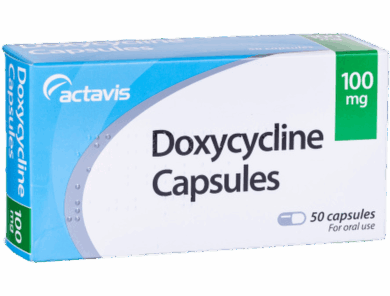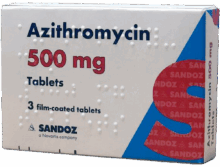
Doxycycline Tablets For Chlamydia x14 Tablets (Full Treatment)
from
£15.99
Doxycycline is antibiotic used to treat chlamydia. According to national guidelines, it is the most effective chlamydia treatment and the recommended option. One capsule should be taken two times a day for 7 days.
Doxycycline Tablets For Chlamydia x14 Tablets (Full Treatment)
Buy doxycycline for chlamydia online
You can order doxycycline online to treat chlamydia if you or your partner have had a positive diagnosis for chlamydia. You will need to fill out an online consultation for one of our pharmacists to assess.
If you or your partner have not had a chlamydia diagnosis, you can buy a home chlamydia test kit, which involves providing a urine sample so that it can be analysed in our partner laboratory. Results usually take 1-2 working days to come back after having sent off your sample using the pre-paid envelope provided.
Doxycycline Prices
| Name & Dosage | x14 Capsules (Full Treatment) |
|---|---|
| Doxycycline 100mg Capsules (Full Treatment) |
£15.99 |
Summary for Doxycycline Tablets for Chlamydia
| Medication Class | Tetracycline antibiotic |
|---|---|
| Mechanism of action | Stops bacterial growth |
| Active ingredient | Doxycycline hyclate |
| Strength | 100mg |
| Effective within | 7 days |
| Dosage Instructions | One 100mg capsule for 7 days |
| Manufacturer | Actavis, Teva, Chanel, Sovereign |
| Use with alcohol | Small amounts |
About Doxycycline
Key points
- Taken twice a day for one week
- Over 99% success rate in treating chlamydia
- Dispatched in discreet packaging
What is doxycycline?
Doxycycline is an antibiotic belonging to the tetracycline class. It is used to treat chlamydia, as well as other infections. It can also be used for the purpose of preventing malaria when travelling.
How does doxycycline work?
Doxycycline interferes with the bacteria’s ability to produce proteins, which are important for its survival. This prevents the bacteria from replicating, until it is no longer active.
How long does doxycycline take to work for chlamydia?
Treatment starts to work relatively quickly, and it takes around 48 hours for doxycycline to start working. However, it can take up to 7 days after having completed treatment, for your body to be free from chlamydia. This is why is it important to avoid any form of sexual contact for 7 days after you have finished treatment.
How effective is doxycycline for chlamydia?
According to research, doxycycline has a 100% success rate in treating chlamydia. It is important to note that treatment must be taken as prescribed, and failure to adhere to the prescribed regime of one capsule twice a day may influence results.
Important note:
- Swallow capsules with a full glass of water, whilst sitting down or standing (you should not take doxycycline close to bedtime to avoid the possibility of throat irritation).
- You should avoid taking any indigestion remedies for two hours before or after taking doxycycline, as they can reduce the effectiveness of treatment.
- You should also stop using any supplements that contain iron, calcium, zinc, magnesium, or aluminium, as they can also negatively impact the effectiveness of treatment.
- It is important to remember to take your medication regularly and to complete the course to ensure it works properly. Failure to do so may mean that the bacteria has not been fully killed and may multiply to form bacteria that has become resistant to doxycycline.
What happens if you miss a dose?
If you forget to take a dose, you should take it as soon as you remember. If you remember when it comes to taking your next dose, do not take two together. It is unlikely that missing one dose will impact the outcome of treatment, but you should inform your doctor or pharmacist. You may need to test for chlamydia a few weeks after having completed treatment to make sure that it has been cleared. Missing more than one dose may have an impact on the outcome of treatment.
Please note – doxycycline and sunlight can cause a photosensitivity reaction
Doxycycline Alternatives
For those that are allergic to doxycycline, or unable to take it, azithromycin is a suitable alternative. It is a 3 day course, and clinical studies have proven it to have a success rate of 97%, with a mild side-effect profile.
Doxycycline ingredients
Active ingredient: Doxycycline hyclate
Inactive ingredients: Sucrose, maize starch, crospovidone, Basic Butylated, Methacrylate Copolymer (Eudragit E100) and Purified Talc
Whilst the active ingredient will remain the same, the inactive ingredients may differ amongst brands. You should read the patient information leaflet supplied with your medication, for a full list of ingredients.
Doxycycline Dosage Instructions
The dose for treating chlamydia is doxycycline 100mg twice a day for 7 days.
Doxycycline Side Effects
Doxycycline can cause side effects, but not everybody will experience them.
Common: affecting up to 1 in 10 users
- Sensitivity to sunlight (such as a skin rash, itching, redness, or severe sunburn)
- Headache and visual disturbances
- Low blood pressure (Hypotension)
- Nausea / vomiting
Uncommon: affecting up to 1 in 100 users
- Vaginal infection (soreness and itching)
- Heartburn/gastritis
You should stop taking your medicine and seek urgent medical attention if you experience:
- A ringing or buzzing noise in the ear (tinnitus)
- Signs of a severe skin reactions
- Circular, irregular red patches
- Rash with flushing, fever, blisters, or ulcers
- Reddening, peeling and swelling that resembles burns
- Symptoms of an allergic reaction
- Sudden wheeziness, difficulty breathing or chest pain
- Fever
- Sudden swellings of the face, lips, tongue, throat, hands, or feet
- Severe rash or itching (especially affecting the whole body)
Doxycycline Warnings
Doxycycline is not suitable if:
- You have taken doxycycline or other antibiotics belonging to the tetracycline class in the past and suffered an allergic reaction
- You are allergic to any of the other ingredients in doxycycline
- You are likely to be exposed to high UV rays such as intense sunlight or sunbeds
- You have liver or kidney problems
- You have any of the following conditions:
- Myasthenia gravis
- Porphyria
- Systemic Lupus Erythematosus
- You have any stomach problems that cause diarrhoea
Doxycycline Interactions
You should discuss the use of doxycycline with your doctor if you are taking any of the following medication:
- Anticoagulants such as warfarin that are used to thin blood
- Antiepileptics
- Certain prescription only medication used to help you sleep, such as those belonging to the barbiturate class
- Certain drugs used in the treatment of migraine, such as ergotamine or methysergide
- Some antivirals used to treat tuberculosis, such as rifampicin
- Antibiotics that contain penicillin such as amoxicillin
- Some high blood pressure medication, such as quinalapril
- Oral Contraceptive Pills
- Certain medication used to treat stomach ulcers, such as sucralfate
- Medication used after a transplant, such as ciclosporin
- Methotrexate
- Retinoids such as isotretinoin used in the treatment of acne
- Medication used in the treatment of indigestion
Doxycycline and Pregnancy/Breastfeeding
Doxycycline is not suitable if you are pregnant, as it can slow down bone growth and stain the teeth of the developing foetus.
Doxycycline is present in breastmilk and should be avoided when breastfeeding.
Frequently Asked Questions
Nausea and vomiting are common side effects of doxycycline. If you vomit after taking doxycycline, you should carry on with the prescribed course. Although doxycycline can make you sick, partial absorption or missing one dose is unlikely to have an effect on the success of treatment. Try taking doxycycline after a meal to reduce feelings of nausea. If you throw up more than once, you should contact your doctor as you may need to try a different treatment.
Food does not affect the absorption of doxycycline and you can choose to take doxycycline on an empty stomach or after food. One of the possible side-effects of taking doxycycline is that it may make you feel slightly nauseas. If this is the case, you may find it helpful to take doxycycline after a meal.
Moderate alcohol consumption will not necessarily have an impact on the effectiveness of doxycycline, but it can make you feel slightly sick and dehydrated. You should avoid drinking large amounts of alcohol or avoid alcohol consumption altogether for the duration of your treatment if possible. Large amounts of alcohol consumption can reduce the effectiveness of doxycycline in treating chlamydia.
It can take 1-2 weeks for chlamydia symptoms to ease off. If your symptoms have not improved after 2 weeks, you should speak to your doctor.
You should visit your GP in the following circumstances:
- You are experiencing an allergic reaction to doxycycline, such as skin irritation or diarrhoea
- You have missed multiple doses
- Your symptoms are persisting after the treatment course
- You have had sexual contact with someone during treatment or within the 7-day period after having completed treatment
- There is a possibility you may be pregnant
- You are experiencing any unusual side-effects such as difficulty breathing, fever, swollen glands.
Doxycycline has a very high success rate, and it is not usually necessary to get tested after you have completed the treatment course. However, you should get retested if you didn’t take your medication as prescribed, you engaged in sexual activity whilst taking treatment, your symptoms still persist, or you have sexual partners that change on a regular basis (testing is recommended every three months in this case).
Chlamydia is the most common sexually transmitted infection and can cause many long-term complications such as infertility and reactive arthritis. You should let your sexual partners know if you have had a positive diagnosis, so that they can receive treatment and avoid re-infecting you or others.
You should wait at least seven days after completing a full course of doxycycline treatment for chlamydia before engaging in unprotected sex. This allows the medication to effectively treat the infection and reduces the risk of transmitting it to sexual partners.
You should let your GP know if you are scheduled to receive a typhoid vaccination whilst on treatment, or within 72 hours after having completed treatment. This is because doxycycline can reduce the effectiveness of typhoid vaccinations.
Each patient must fill out a questionnaire individually as it assesses the suitability of doxycycline based on their medical status. The online consultation is intended to ensure that our service is safe for all those that we prescribe treatment for. Everyone must complete an individual consultation using their own account. Multiple orders under the same account will be rejected.
Your medical records are stored on a secure server which is not shared with anyone. Your order will be dispatched in a plain envelope that has no reference to what is inside.
Product Reviews
product rated 4.7/5
Brilliant, would definitely recommend 👌! No issues at all.
By Daniel Vidal (via Reviews.io)it works for me
By Customer (via TrustPilot)Fantastic fast easy service Many thanks
By Paul (via TrustPilot)Worked for me gave me peace of mind
By Mr Firth (via TrustPilot)Superintendent Pharmacist
Written by Chemist Click
First created 23rd April 2025
Last reviewed 10th October 2025
Other options include:

Our Awards & Certifications
Our team of experienced pharmacists and healthcare professionals are dedicated to providing the highest level of care and service to every customer, ensuring that they receive the best possible healthcare experience.

Our Clients Say:
Constantly good service, always very quick to deliver items.
By Phil ElliottHighly recommend. Fast delivery. Reliable.
By Carlene GraceHad a great experience, right from consultation to med delivery it was very efficient and professional. Thanks.
By Shefali PathakEasy to navigate website, regularly use their service, prompt timely delivery, discounts for regular customers could be considered.
By ArunI shopped around before purchasing and items price was good. Delivery was prompt and P+P reasonable. Item was as described. Good service.
By Mark LockettGood website, intuitive with great information. Efficient, from payment through to delivery, and good communication updates all the way.
By Graeme WalkerExcellent service. I ordered some meds which was dispatched very quickly and arrived super fast. The meds has a very long expiry date. I would definitely order again. Many thanks.
By Ian TBest company there is for me. Great service and excellent quality plus pricing is perfect. I wouldn't want to use anyone else in all honesty. I have recommended this company to all my friends. It's a tricky subject for us older guys but this company makes it all respectful and they discretion is very much appreciated by us all.
By Mr Franklin









